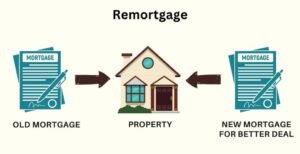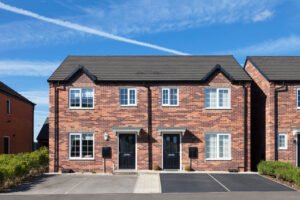
The age-old question: rent or buy? This decision can significantly impact your financial future. While renting offers flexibility, buying a property can be a strategic investment that builds wealth and unlocks long-term benefits. Let’s delve into the key factors to consider, using clear examples with figures to illustrate why, in many cases, buying a property can be a smarter financial move than renting.
Building Equity vs. Funding Someone Else’s Dreams
When you rent, you’re essentially paying someone else’s mortgage (or if the property has no mortgage, you’re funding their ‘mortgage-free’ lifestyle). Each month’s rent payment contributes to their property’s equity, not yours. In contrast, buying allows you to build equity with every mortgage payment. Over time, this accumulated equity translates to realisable wealth.
Example: Renting vs. Buying – A 10-Year Comparison with Clear Figures
Imagine you’re considering a property with a purchase price of £200,000. The average monthly rent in your area is £1,000. Let’s explore the difference after ten years, assuming a higher interest rate environment (6%, considered high in many markets) for buying:
-
Renting: Over ten years, you’ll have paid a total of £120,000 in rent – money that has gone towards your landlord’s wealth, not yours. You’ll have no ownership stake in the property. That’s £120,000 you will never get back…it’s gone.
-
Buying (assuming a 25-year mortgage with a 6% interest rate and a 10% deposit):
- Deposit: £20,000 (10% of £200,000)
- Mortgage Amount: £180,000 (purchase price – deposit)
- Monthly Mortgage Payment (estimated): £1,160
Please note: Figures provided throughout this guide are based on a standard mortgage repayment calculator. The actual payment may vary depending on the specific loan terms, though this guide assumes an average fixed rate of 6% for 10 years.
Let’s calculate the potential gain from buying after 10 years (assuming certain scenarios):
Mortgage Principal Paid Down After 10 Years (estimated): £43,000
Property Value Appreciation (assumed): 20% (£200,000 x 20% = £40,000)
Total Gain from Buying (assuming appreciation and principal paydown above): £83,000 (£43,000 principal paydown + £40,000 appreciation in value)
Here’s where it get’s even more exciting
We’ve accounted for the capital repayment over the 10 years (+£43,000) as well as the capital appreciation from the value of the house increasing (+£40,000). But we haven’t mentioned the £120,000 you would have otherwise lost with no tangible asset, if you had decided to rent for the same 10 year period.
So really, when you account for this as part of the equation, you not only have the redeemable gain of £83,000, but you also have the loss saved of £120,000. So the maths is either Renting (-£120,000) or Buying (+£83,000 plus having somewhere to live for the period at no additional cost).
Adding that £120,000 saving to the equation makes you realise how by just continuing to do something you would otherwise do each month (pay your living cost), you leave £83,000 better off, and also had somewhere to live for the entire 10 year period. This is why buying property has the potential to snowball and make wealth-building automatic.
ps. We didn’t even include your initial £20,000 downpayment, which after the 10 year period, would also be redeemable if you sold the property based on the 20% increase in value. Even without this, the numbers still stack.
Important Assumptions to Consider:
- This example assumes a constant property value appreciation of 20% after 10 years. Property values can fluctuate, and there’s no guarantee of appreciation, or the exact timeline in which it will occur. Factors such as when you bought and at what price you bought can also influence this.
- Maintenance costs and property taxes are not factored into this example. These ongoing expenses will affect the overall gain from buying.
Comparing Renting vs. Buying Outcomes:
By renting for ten years, you would have paid out £120,000 with no ownership stake in a property. By buying, even with a higher interest rate, you could potentially have gained £83,000 after ten years, considering the deposit, principal repayment, and property value appreciation (assuming our scenario).
Beyond Equity: The Power of Leverage and Potential Appreciation
Property ownership offers the potential for leverage. With a deposit, you can leverage a mortgage to acquire an asset worth significantly more. As property values rise (often outpacing inflation), your investment can appreciate, further boosting your wealth.
Example: Leveraging Your Way to Wealth Creation (Even with a Higher Interest Rate)
Let’s revisit the £200,000 property example. Here’s a quick refresher. With a 10% deposit (£20,000), you’d secure a mortgage for £180,000. If, after ten years, the property value appreciates by 20% to £240,000, you’d see a significant gain on your initial investment, even with the higher mortgage interest rate.
Financial Planning Benefits: Using Property as a Springboard
Property ownership can be a springboard for future financial goals. The equity you build can be used to:
-
Access additional funds: Borrowing against the added equity in the property can provide capital for further investments, renovations, or even debt consolidation with potentially lower interest rates.
-
Raise funds for future property purchases: The equity in your existing property can act as a springboard to invest in additional properties, building a rental portfolio and generating passive income.
Managing Debt: Building vs. Renting
While managing a mortgage payment might seem daunting, it can be a form of “forced savings,” encouraging responsible financial behaviour. Conversely, renting can sometimes lead to lifestyle inflation, where you spend any leftover income instead of directing it towards wealth-building goals. Additionally, even with a higher interest rate, a fixed-rate mortgage offers more predictability in your monthly payments compared to rents which can fluctuate over time (landlords certainly can raise rents, should they so choose).
It’s Not Always Black and White: Considering Your Circumstances
While buying a property offers significant financial advantages in the long run, it’s important to consider your individual circumstances. Here are some scenarios where renting might be a more suitable option:
-
Short-term living situation: If you plan to move frequently for work or other reasons, the flexibility of renting might be preferable. Though there are ways you can still do this whilst owning a property (which is the subject of another guide for another day).
-
Unstable income: If your income is unpredictable, the stability of a fixed rental payment might be more manageable. Though this can be compared to a fixed term mortgage, which can offer the same desired stability, with more certainty too.
-
Limited deposit: Raising the deposit is often a major barrier for most who want to purchase a property. If you haven’t saved enough for a sufficient deposit, renting might be the wiser choice until you accumulate the necessary funds, especially in a higher interest rate environment. Please note, there are advance tactics that can be used to help you buy a property with little to no deposit (and without relying on government schemes).
We Do More Than Mortgages: Guiding You Towards Long-Term Success
The decision to rent or buy is a significant one. If you’re considering this and want help with getting from where you are now to eventually being a property owner, we offer comprehensive property guidance to help you:
- Evaluate your financial situation and goals
- Explore different property options aligned with your long-term plans
- Develop a strategy to leverage property for wealth creation, considering both potential appreciation and potential future interest rate environments
- Connect you with the right mortgage products to fit your needs, even if interest rates are high
Contact us today for a no-obligation consultation and let’s navigate the path towards a secure and prosperous future together!
We can help you make informed choices about renting vs. buying, considering not just the current situation but also your long-term financial goals.






